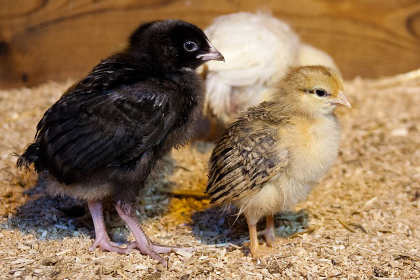
Organic Consumers Association’s Comments to the National Organic Standards Board April 28, 2015
Opposition to Increasing the Levels of Synthetic Methionine in Organic Poultry Feed
Organic consumers expect the organic poultry and egg products they purchase to come from birds that spend their lives with unhindered access to the outdoors, exhibiting natural behaviors like sun bathing, dust bathing, scratching and pecking, chasing bugs and nibbling on fresh forage. After all, organic rules require organic producers to provide “living conditions which accommodate the health and natural behavior of animals, including … [y]ear-round access for all animals to the outdoors, shade, shelter, exercise areas, fresh air, clean water for drinking, and direct sunlight” and prohibit “[co]ntinuous total confinement of any animal indoors.”
Organic consumers don't expect organic poultry to be fed synthetic nutrients as a substitute for the foraged components of their natural diet, or as a means of stimulating increased growth hormone production.
Opposition to Increasing the Levels of Synthetic Methionine in Organic Poultry Feed
Organic consumers expect the organic poultry and egg products they purchase to come from birds that spend their lives with unhindered access to the outdoors, exhibiting natural behaviors like sun bathing, dust bathing, scratching and pecking, chasing bugs and nibbling on fresh forage. After all, organic rules require organic producers to provide “living conditions which accommodate the health and natural behavior of animals, including … [y]ear-round access for all animals to the outdoors, shade, shelter, exercise areas, fresh air, clean water for drinking, and direct sunlight” and prohibit “[co]ntinuous total confinement of any animal indoors.”
Organic consumers don’t expect organic poultry to be fed synthetic nutrients as a substitute for the foraged components of their natural diet, or as a means of stimulating increased growth hormone production.
But the sad reality is that the vast majority of organic turkey, chicken and eggs offered in retail stores come from birds that have been raised on an organic version of the same corn- and soy-based diet that conventionally raised chickens are fed, confined indoors in huge warehouses—of tens or even hundreds of thousands of birds—that are more factory than farm.
In spite of the ban on growth-promoting hormones in organic poultry production, organic producers are encouraged to maintain their flocks indoors on a nutrient-poor diet through the allowance of synthetic methionine, a sulfur-containing essential amino acid that is lacking in standard feed rations.
The poultry industry has argued that natural methionine is difficult to obtain in sufficiently high concentrations and it is necessary to use synthetic methionine. But, synthetic methionine is also fed to chickens to increase egg production in laying hens and to increase weight in broiler chickens, through the stimulation of IGF-growth hormone and receptors.
“There are hormone-like effects of methionine on layers: the intake of Met (methionine) controls the amount of egg output, and the hens consume energy to meet the requirement for this amount of egg output.” (Harms et al, Applied Poultry Science, 1998). For broilers, “Addition of methionine improved animal performance by stimulating synthesis and release of growth factor.” Del Vesco et al. 2013.
It’s clear that one advantage large-scale organic producers see in the use of synthetic versus natural methionine is the ease of controlling the rations. “Larger poultry operations change the rations frequently to keep cost down by only feeding to meet the bird’s needs.”
The use of synthetic methionine is a convenience of industrial production, not a necessity.
As the NOSB Technical Advisory Panel (TAP) review pointed out: “Humans have raised poultry for centuries without synthetic amino acids. Synthetic amino acids have become part of the standard poultry diet only over the past 50 years or so as production has moved from extensive pasture-based nutrition to high-density confinement systems.”
The European example is also proof that poultry can be raised without synthetic methionine. It just takes a greater amount of outdoor access and a switch to poultry breeds that grow more slowly.
Sadly, American organic poultry management has much more in common with its conventional U.S. counterpart than the practices of European organic farmers.
The Organic Consumers Association, backed up by 17,000 people who signed our most recent petition, urge you to reject the petition to increase synthetic methionine levels.
When synthetic methione is reviewed at the next sunset it should be removed from the National List.
Synthetic methionine is not congruent with the principles of organic farming or the expectations of organic consumers.
Most importantly, the National Organic Program needs to get serious about enforcing the organic rules that require organic producers to provide “living conditions which accommodate the health and natural behavior of animals, including … [y]ear-round access for all animals to the outdoors, shade, shelter, exercise areas, fresh air, clean water for drinking, and direct sunlight.”
There are too many so-called organic chickens and turkeys that are spending their lives continuously and totally confined indoors. This is a violation of the organic rules and until this illegal practice is banished from organic, consumers will have no reason to trust an industry that claims to need a synthetic feed additive for the sake of the birds’ health.
